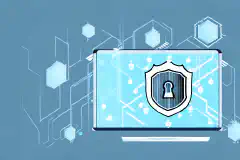Cybersecurity Basics: A Comprehensive Guide to Protecting Your Digital Life

Table of Contents
Cybersecurity For Beginners: A Non-Technical Guide to Understanding Cybersecurity Basics
In today’s digital era, it’s more important than ever to understand the basics of cybersecurity. With more and more of our daily lives taking place online, from banking to online shopping and social media, it’s essential to stay safe and secure while using the internet. This non-technical guide will provide beginners with an understanding of cybersecurity essentials and practical tips for staying protected online.
Understanding the Fundamentals of Cybersecurity
Cybersecurity refers to the protection of digital devices, networks, and sensitive information from cyber threats. A cyber threat is any unauthorized attempt to gain access to your devices, networks, or data. This can include everything from viruses and malware to phishing attacks and identity theft.
As the world becomes increasingly digital, cybersecurity has become a critical concern for individuals, businesses, and governments alike. Cyber attacks can cause significant financial losses, reputational damage, and even physical harm.
There are three primary goals of cybersecurity: confidentiality, integrity, and availability. Confidentiality means that only authorized users can access sensitive data, while integrity ensures that the data remains unchanged and accurate. Availability means that authorized users can access data whenever they need it.
Confidentiality is critical for protecting sensitive information such as personal data, financial information, and trade secrets. To achieve confidentiality, cybersecurity professionals use a variety of techniques such as encryption, access controls, and secure communication channels.
Integrity is essential for ensuring that data is accurate and reliable. Cybersecurity professionals use techniques such as digital signatures and checksums to detect any unauthorized changes to data. They also use backup and recovery systems to ensure that data can be restored in the event of a cyber attack.
Availability is crucial for ensuring that authorized users can access data whenever they need it. Cybersecurity professionals use techniques such as redundancy, load balancing, and failover systems to ensure that data is always available, even in the event of a cyber attack.
One of the biggest challenges in cybersecurity is keeping up with the constantly evolving threat landscape. Cyber criminals are constantly developing new techniques and tools to bypass security measures and gain access to sensitive information. Cybersecurity professionals must stay up-to-date with the latest threats and technologies to ensure that they can protect against these ever-changing threats.
In conclusion, cybersecurity is a critical concern in today’s digital world. By focusing on confidentiality, integrity, and availability, cybersecurity professionals can help protect individuals, businesses, and governments from the devastating effects of cyber attacks.
Why Cybersecurity Matters for Beginners
Even if you don’t consider yourself a tech-savvy individual, cybersecurity matters to everyone. Cyber threats can affect anyone who uses a digital device, from individuals to small businesses and large corporations. A cyber attack can lead to significant financial losses, identity theft, and reputational damage.
When it comes to cybersecurity, prevention is key. There are several steps you can take to protect yourself and your sensitive information. First and foremost, always use strong passwords and change them frequently. This will make it more difficult for hackers to access your accounts. Additionally, be wary of suspicious emails and links. Phishing scams are a common tactic used by cyber criminals to gain access to your personal information.
Another important aspect of cybersecurity is keeping your software up to date. Software companies regularly release updates that include security patches to protect against new threats. By keeping your software up to date, you can ensure that your devices are protected against the latest cyber threats.
It’s also important to be mindful of the information you share online. Social media platforms, in particular, can be a treasure trove of personal information for cyber criminals. Be careful when sharing personal details, such as your date of birth or home address, and adjust your privacy settings to limit who can see your posts.
Finally, consider investing in cybersecurity software. Antivirus and firewall programs can help protect your devices from malware and other cyber threats. While these programs are not foolproof, they can provide an additional layer of protection for your sensitive information.
By taking these steps and understanding the basics of cybersecurity, you can protect yourself from cyber threats and minimize the risk of financial loss, identity theft, and reputational damage.
Essential Concepts for Grasping Cybersecurity Basics
As technology continues to advance, cybersecurity has become a critical issue that affects everyone. Cybersecurity basics are the fundamental measures that you need to take to protect your devices and personal information from cyber attacks. Understanding these essential concepts is crucial in safeguarding yourself against cyber threats.
Network security is an integral part of cybersecurity. It involves protecting your network and devices from unauthorized access, misuse, modification, or denial of service attacks. By implementing firewalls, antivirus software, and regular updates, you can ensure that your network is secure and free from vulnerabilities.
Encryption is another crucial technique used to protect sensitive data. It involves transforming data into an unreadable format using encryption algorithms, making it difficult for hackers to decipher. Encryption is used to secure data both in transit and at rest, ensuring that your information is safe from prying eyes.
Authentication is the process of verifying the identity of a user or device. It ensures that only authorized users can access your information or devices. Authentication methods include passwords, biometric identification, smart cards, and tokens. By implementing strong authentication measures, you can prevent unauthorized access to your sensitive data.
Access control is the practice of limiting access to sensitive data to only those who need it. It involves implementing policies and procedures to ensure that only authorized users can access your information. Access control measures include role-based access control, mandatory access control, and discretionary access control. By implementing access control measures, you can prevent unauthorized access to your data and minimize the risk of data breaches.
In conclusion, cybersecurity basics are essential in safeguarding your devices and personal information from cyber threats. By understanding the concepts of network security, encryption, authentication, and access control, you can protect yourself from cyber attacks and ensure that your data is secure.
Exploring Common Cyber Threats and How to Stay Protected
Cyber threats have become a major concern in today’s digital age. With the increasing use of technology, it has become easier for cybercriminals to exploit vulnerabilities and gain access to sensitive information. It’s essential to understand what these threats are and how to protect yourself from them.
One of the most common cyber threats is viruses and malware. These are malicious programs that can infect your computer and cause damage to your files and system. They can be spread through email attachments, software downloads, and even social media links. To protect yourself from these threats, you should ensure that your antivirus software is up-to-date and that you are only downloading software from trusted sources.
Another common cyber threat is phishing attacks. These are fraudulent attempts to obtain sensitive information such as usernames, passwords, and credit card details. Phishing attacks can be carried out through emails, text messages, or even phone calls. To protect yourself from these threats, you should be cautious when opening emails or links from unknown sources. Always verify the sender’s email address and check for any spelling or grammatical errors in the message.
Identity theft is another significant cyber threat that can result in financial loss and damage to your reputation. Cybercriminals can steal your personal information such as your name, address, and social security number and use it to open bank accounts or credit cards in your name. To protect yourself from identity theft, you should be careful when sharing sensitive information online. Only share information with authorized individuals or organizations and ensure that the website you are sharing it with is secure.
To stay protected from these threats, you should ensure that your devices and software are regularly updated with the latest security patches. This will help to close any vulnerabilities that cybercriminals may exploit. Additionally, you should use a strong password to access your sensitive information. A strong password should be at least 12 characters long and include a mix of uppercase and lowercase letters, numbers, and symbols.
In conclusion, cyber threats are a real and growing concern in today’s digital age. By understanding what these threats are and how to protect yourself from them, you can stay safe online and avoid becoming a victim of cybercrime.
Building a Strong Foundation in Cybersecurity for Beginners
To build a strong foundation in cybersecurity as a beginner, there are a few key steps you should take. Firstly, stay informed about the latest cybersecurity threats and trends by keeping up-to-date with reputable online resources and news outlets. You should also ensure that your devices and software are regularly updated with the latest security patches.
Additionally, you should be cautious when it comes to sharing sensitive information online and ensure that you are using strong passwords and multi-factor authentication techniques whenever possible. Finally, consider investing in reputable antivirus software and network security measures, such as firewalls and secure VPNs.
Practical Tips for Enhancing Your Online Security
There are several practical tips you can follow to enhance your online security, including:
- Using strong and unique passwords
- Enabling two-factor authentication on all your accounts
- Limiting the amount of personal information you share online
- Being cautious when opening emails or links from unknown sources
By following these tips, you can reduce your risk of becoming a victim of cyber threats.
The Role of Awareness in Cybersecurity for Beginners
One of the most important aspects of cybersecurity for beginners is awareness. By staying informed about the latest cybersecurity threats and trends, you can take proactive steps to protect yourself and your sensitive data. Additionally, you should be cautious when it comes to sharing sensitive information online and ensure that you are using strong passwords and multi-factor authentication techniques whenever possible.
Key Elements of a Robust Cybersecurity Strategy
A robust cybersecurity strategy involves several key elements, including:
- Regular updates and security patches for devices and software
- Strong and unique passwords and multi-factor authentication techniques
- Network security measures, such as firewalls and secure VPNs
- Limiting the amount of personal information you share online
By following these elements and staying informed about the latest cybersecurity threats and trends, you can build an effective cybersecurity strategy and protect your sensitive data from cyber threats.
Introduction to Cybersecurity Best Practices for Beginners
When it comes to cybersecurity best practices, there are several key steps you should take as a beginner, including:
- Regularly updating your devices and software with the latest security patches
- Using strong and unique passwords and multi-factor authentication techniques
- Limiting the amount of personal information you share online
- Being cautious when opening emails or links from unknown sources
Additionally, consider investing in reputable antivirus software and network security measures, such as firewalls and secure VPNs .
Navigating the Digital Landscape: A Beginner’s Guide to Cybersecurity
In today’s digital age, it’s crucial to have a solid understanding of cybersecurity to protect your sensitive information from cyber threats. By following best practices, you can navigate the digital landscape with confidence and ensure your online safety. Here are some key steps to get you started:
Stay informed: Keeping up-to-date with the latest cybersecurity threats and trends is essential. Regularly visit reputable online resources and news outlets that provide valuable insights into the evolving cyber landscape. Websites like Cybersecurity and Infrastructure Security Agency (CISA) and KrebsOnSecurity offer valuable information and news updates related to cybersecurity.
Practice strong password hygiene: Using strong and unique passwords is critical to protect your online accounts. Avoid using common passwords or personal information that can be easily guessed. Instead, create complex passwords that include a combination of uppercase and lowercase letters, numbers, and special characters. Consider using a password manager like Bitwarden or KeePassXC to securely store and manage your passwords.
Implement multi-factor authentication (MFA): Adding an extra layer of security through MFA helps prevent unauthorized access to your accounts. With MFA, you need to provide additional verification, such as a unique code or biometric authentication, in addition to your password. Many online platforms and services, including Google , Microsoft , and Facebook , offer MFA options to enhance your account security.
Limit personal information exposure: Be cautious about the personal information you share online. Avoid oversharing on social media platforms and adjust your privacy settings to control who can access your posts and personal details. Additionally, be wary of phishing scams that attempt to steal your personal information through deceptive emails or websites. Always verify the legitimacy of the sources before sharing any sensitive information.
Invest in reputable security measures: Consider using reputable antivirus software to protect your devices from malware and other cyber threats. Some popular antivirus solutions include Norton , Bitdefender , and Kaspersky . Additionally, ensure that you have a firewall enabled on your devices to monitor and filter incoming and outgoing network traffic. If you frequently connect to public Wi-Fi networks, using a secure VPN service like ExpressVPN or NordVPN can encrypt your internet connection and add an extra layer of protection.
Remember, cybersecurity is an ongoing effort. Stay proactive, educate yourself about emerging threats, and adapt your security practices accordingly. By taking these steps, you can navigate the digital landscape with confidence and protect your sensitive information from cyber threats.





